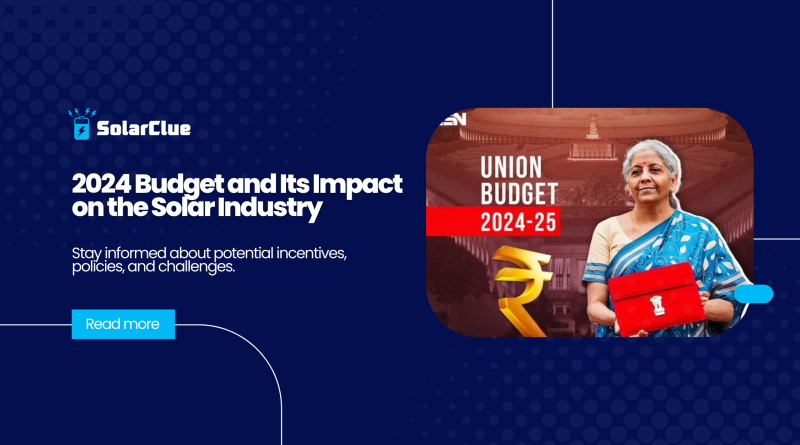2024 Budget and Its Impact on the Solar Industry
The 2024 budget has brought a wave of anticipation and excitement across various sectors, with renewable energy, particularly solar, being a significant focus. The government’s commitment to sustainable development and reducing carbon emissions is evident in the detailed provisions and allocations made for solar energy projects. This blog delves into the budget 2024 highlights, analyzing its impact on the solar industry and outlining the implications for businesses and consumers.
Table of Contents
Detailed Analysis of the 2024 Budget
1. Increased Allocation for Renewable Energy:
The budget 2024 highlights has earmarked a substantial increase in funding for renewable energy projects. This includes a significant portion dedicated to solar energy. The government has recognized the pivotal role solar power plays in achieving energy security and sustainability goals.
2. Enhanced Subsidies and Incentives:
One of the standout features of the budget is the enhanced subsidies for solar energy installations. These subsidies aim to make solar power more accessible to both urban and rural populations. Additionally, tax incentives for solar equipment manufacturers and installers have been introduced to boost domestic production and reduce dependency on imports.
3. Focus on Infrastructure Development:
The budget outlines comprehensive plans for developing solar infrastructure. This includes setting up large-scale solar parks, improving grid connectivity, and investing in energy storage solutions. These initiatives are designed to ensure a stable and efficient supply of solar power across the country.
4. Research and Development:
To foster innovation in the solar sector, the budget allocates funds for research and development. This includes grants for academic institutions and private firms to develop advanced solar technologies, improve efficiency, and reduce costs.
Specific Allocations for Solar Energy Projects
1. Solar Parks and Ultra Mega Solar Power Projects:
The budget allocates funds for the establishment of new solar parks and the expansion of existing ones. The focus is on creating ultra mega solar power projects that can generate substantial power output and cater to the energy needs of large regions.
2. Rooftop Solar Installations:
A dedicated fund has been set up to promote rooftop solar installations in residential, commercial, and industrial sectors. This includes subsidies for rooftop solar panels, making it more affordable for homeowners and businesses to switch to solar energy.
3. Solar Pumping Systems for Agriculture:
Budget 2024 highlights Recognizing the importance of solar energy in agriculture, the budget has allocated resources for the installation of solar pumping systems. This initiative aims to provide farmers with a reliable and cost-effective alternative to traditional diesel pumps, thereby reducing operational costs and environmental impact.
4. Grid-Scale Energy Storage Solutions:
To address the intermittency issues associated with solar power, the budget includes provisions for developing grid-scale energy storage solutions. These projects are crucial for ensuring a consistent supply of solar energy, especially during non-sunny hours.
Implications for Businesses and Consumers
1. Business Growth and Opportunities:
The increased funding and incentives present significant growth opportunities for businesses in the solar sector. Solar equipment manufacturers, installers, and service providers can expect a surge in demand, leading to business expansion and job creation. Additionally, the focus on domestic production is likely to reduce costs and increase competitiveness.
2. Consumer Benefits:
For consumers, the enhanced subsidies and incentives mean lower upfront costs for solar installations. Homeowners can take advantage of rooftop solar subsidies to reduce their electricity bills and contribute to environmental conservation. Businesses can benefit from tax incentives and reduced operational costs by adopting solar energy solutions.
3. Long-Term Sustainability:
The budget’s emphasis on infrastructure development and R&D ensures the long-term sustainability of the solar industry. Improved grid connectivity and energy storage solutions will enhance the reliability and efficiency of solar power, making it a viable alternative to traditional energy sources.
4. Environmental Impact:
By promoting solar energy, the 2024 budget aligns with global efforts to combat climate change. The increased adoption of solar power will significantly reduce greenhouse gas emissions, contributing to a cleaner and greener environment.
Conclusion
The 2024 budget marks a significant milestone for the solar industry in India. With increased funding, enhanced subsidies, and a clear focus on infrastructure and innovation, the government is paving the way for a sustainable energy future. Businesses and consumers alike stand to benefit from these initiatives, making solar energy more accessible, affordable, and reliable. As the world continues to grapple with environmental challenges, India’s commitment to solar power sets a commendable example for other nations to follow.
By embracing the opportunities presented by the 2024 budget, India can accelerate its transition to renewable energy, ensuring energy security and environmental sustainability for future generations.



